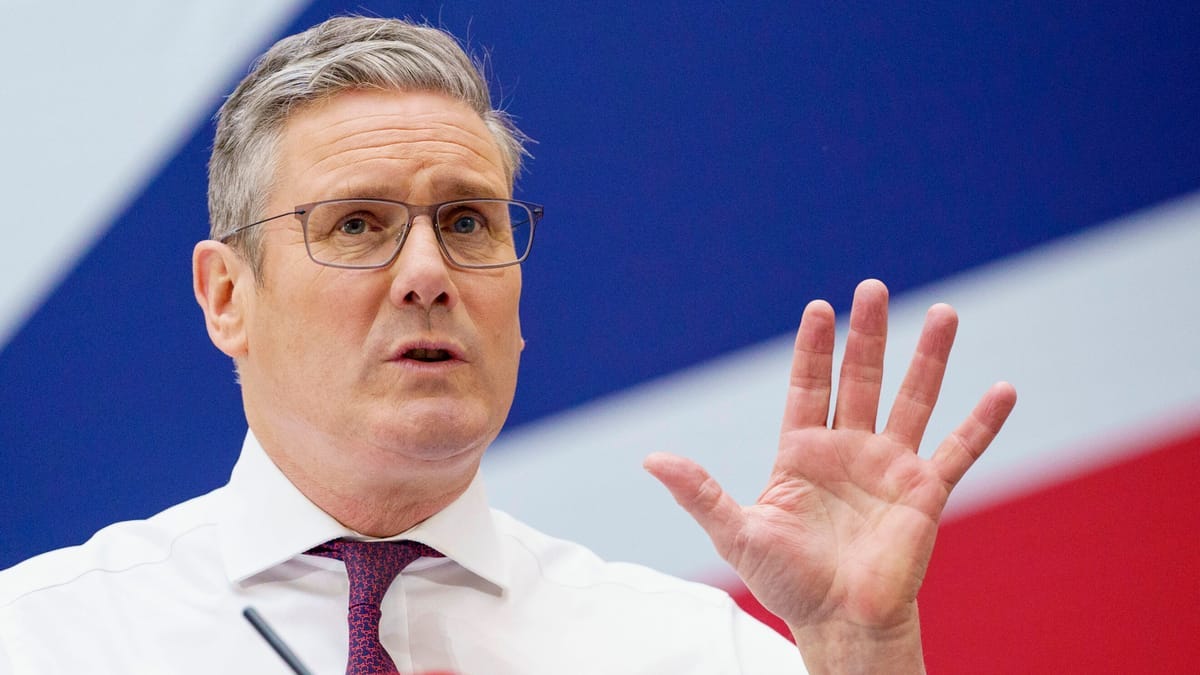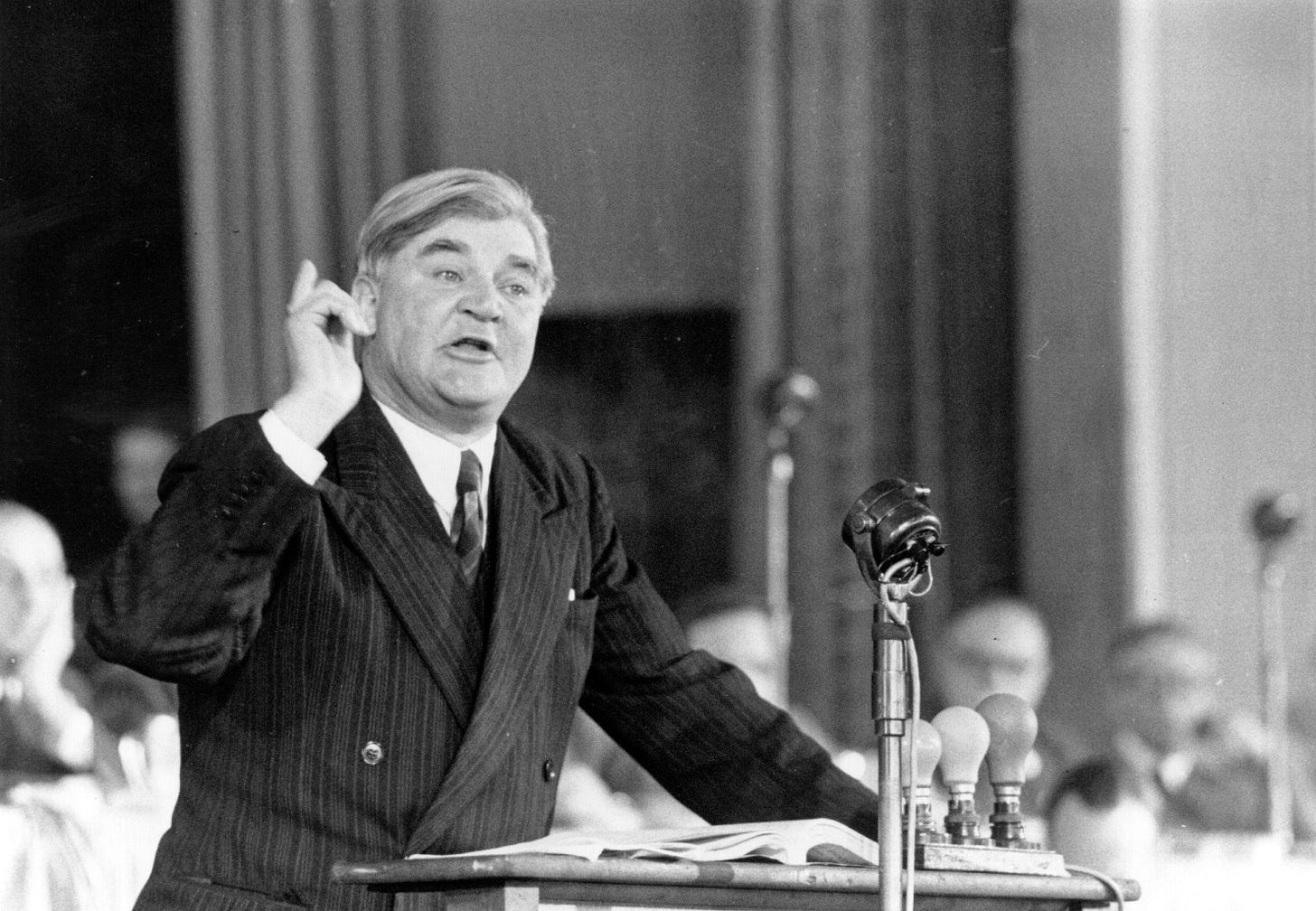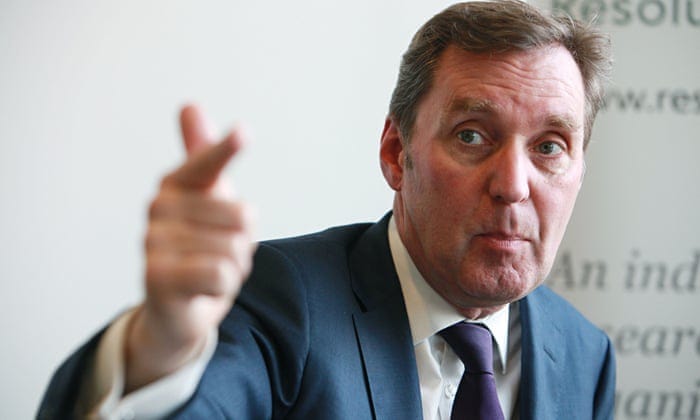Don't vote Labour: there's nothing there
The government has faults, as all governments do, but don't let Labour win by default, because they are still not a party ready for office and the task of governing
I spend quite a lot of time here and on Twitter criticising government policy and the actions of current and former ministers; and there are those, believe it or not, who think I am therefore an unreliable Conservative, a potential Trojan horse or turncoat. But I am, and have always been, a Conservative, if not always formally a party member, and I certainly have no intention of being told I don’t fit into the ideology or behaviour expected when I’ve been attending events, listening to speaker and articulating policy for 30 years. When you were pleasantly surprised by the fluency and commitment of a young Home Office minister called Michael Forsyth, you realise you’ve been in the game a long time.
It is true that I do criticise ministers. Perhaps it’s having had to be politically neutral for a decade of my professional life, as well as responsible for enforcing rules and standards. But I think there is also an element of holding “my” government to a higher standard, of expecting more of them because I’ve given them my support. (For what it’s worth, I didn’t vote for Johnson as party leader, I feared he would be a disaster and was relieved, if in a grim way, when he quit. Nor did I vote for Liz Truss, who seemed too potent a mixture of vaulting ambition and sheer oddness, an accurate assessment which unravelled itself in less than two months. My point is that this is not where I’d hoped we would be, but it’s a Conservative government and so we’ve got to get on with it, and by encouragement, assistance and warning we have to try to make it the best it can be.
None of the above should be taken to mean that my pencil will be hovering over the name of the Labour candidate at the next general election. (Not that it really matters: Ruth Cadbury is sitting on a majority of about 10,000, overturning which, in the current climate, seems ambitious, to say the least. She’s not exactly a rabid Lefty, a Quaker from the family of Birmingham confectioners who voted for Owen Smith in Labour’s 2016 leadership election and is Sir Keir Starmer’s shadow international trade minister, tabling worthy and detailed parliamentary questions.) I’ve never voted Labour and I can’t imagine the circumstances under which I would, because the way the party views society and the world is simply too different from mine.
I am not one of those commentators who loftily disdains party politics as if it is beneath respectable people, far less prone to the great centrist delusion with its hankering for improbable coalitions. As I’ve said before, ideology matters, and a central part of democratic politics is proposing, debating and implementing ideas. If there is a better way of doing this than forming groups of people loosely in philosophical agreement and presenting them to the voters, then we have yet to find it.
But I know that politics is played at the high and the low. I set out a while ago what the Conservatives need to focus on if they want to have a hope of retaining power next year, and some of it is short-term, tactical positioning, but there is also the “high” of huge questions like how our society approaches work and business, how we talk to each other politely but robustly to create a beneficial civic discourse, and what our place in the world is to be in the post-Brexit, post-corona world, with America’s political direction deeply uncertain and China beginning to lose pace compared to India. An example of combining this “high/low”, which was sadly obscured this weekend by the furore over Suella Braverman and her driving licence, is the Hiroshima Accord, a partnership between the UK and Japan, announced by Rishi Sunak at the recent G7 summit in Japan. This combines practical measures like the vital task of reducing our reliance on Taiwanese semiconductors with much broader, longer term issues like security cooperation in the Pacific and the development of the Comprehensive and Progressive Agreement for Trans-Pacific Partnership (CPTPP).
The Conservatives can look after themselves for today. I want to look at the Labour Party. It’s an eternal verity of politics that oppositions don’t win elections, government’s lose them, but I think, especially with the understandable thirst for some kind of fresh start or reboot in society, that Labour ought to want to do more than just be “the other guys”, and might think about the major challenges we face and how we adapt our world to meet them. I came late in the game to appreciating some of Sir Tony Blair’s qualities (while still deploring others), but I think even his harshest critic would have to admit that he arrived at Downing Street in May 1997 with at least a broad-brush vision of how he wanted the UK to be, rather than just a dreary refutation of government policy. So too, I have argued in the past, did John Major, but his surprisingly long premiership—six and a half years in total—was fatally undermined early on by economic reverse and Major’s extraordinary sensitivity to media criticism.
Sir Keir Starmer? I’m not so sure. I recognise that, in the three years since he became leader of the Labour Party, he’s had a lot of work to do internally to detoxify the swamp that Jeremy Corbyn left, and recurring headlines demonstrate that it is a task which is neither easy nor yet complete. Some have accused him of taking events rather too sedately; at his second party conference as leader, in 2021, he attempted to make some ideological headway with a 14,000-word essay for the Fabian Society, The Road Ahead, but I was not alone in thinking it was too wordy, too obscurantist, too heavy to make much progress in connecting with the electorate.
More recently, the Labour leader edged closer to Blairite pledge cards by setting out 5 Missions for a Better Britain, which had the virtue of understanding why clarity and concision are important. But intellectually this remains a spartan framework. Ambitions like “Making Britain’s streets safer” and “Building an NHS fit for the future” are inarguable goods, though they fall foul of Roy Jenkins’s adage that a statement is only interesting if you could imagine a sane man saying the opposite.
You may think I’m being too critical. His Fabian essay was too dense, his missions are too broad-brush. But there does have to be a happy medium. More than that, the missions demonstrate an intellectual hollowness, a parading of means without reference to or grasp of the existence of ends. The first mission is for the UK to secure the highest sustained growth in the G7. That sounds for all the world like a convenient messaging point for when you’ve completed the task. The party will be “focussed on outcomes that matter”; well, that’s better than a commitment to irrelevant results. That focus will be “relentless”; sure, but that’s essentially a pledge to work jolly hard, which is largely meaningless. Starmer promises “Business working with unions. The private sector working with the public sector. And a common partnership between national and local government.” Again, admirable in its own way, but it’s methodology, not outcome.
What is lacking is a sense of what this progress—assuming it is even remotely achievable—is actually for. What do we want public spending to focus on? Do we think public spending is too low, or too high, or simply allocated to the wrong priorities? However simplistic a mantra it can become, free-market Tories are right to point out that the government currently spends around 45 per cent of GDP (it reached nearly half at the height of the pandemic in 2020), the highest sustained level it has been at since the Second World War. There is a section of Conservative thought, to which I strongly subscribe, which believes that lowering the tax burden (and therefore government spending) is an inherent good, because it leaves more of people’s incomes under their control, to be spent as they decide. I also take the general view that government is usually the worst way to achieve almost any end, but it is sometimes the only way to do it; I’m not, for example, suggesting we scrap the armed forces and outsource to the Wagner Group.
Where does Labour stand? Does it share this belief in the immanent virtue of low taxation and spending? Certainly it has given no indication of that. Does it, by contrast, believe in the state as an effective and virtuous instrument of social policy, and is therefore relaxed about, even keen on, high government spending? There has been no suggestion of that either. Instead we seem to have a tacit acceptance of the current rate of taxation, with some adjustments within that overall sphere. Starmer wants to reduce the tax burden on “working people”, though his definition of that label is far from clear. Labour would restore the 45 per cent rate of income tax, and shadow ministers have talked repeatedly of a “windfall tax” on energy providers. The party opposed the reduction of corporation tax announced last year (though has not pledged to reverse it) and has in the past hinted at a substantial rise in digital sales tax.
Essentially Starmer’s philosophy seems to be a crudely populist one that “working people”, by which he means potential Labour voters, will have marginal taxes trimmed because they are, by implication, virtuous, whereas taxes which fall either on the wealthy or on businesses will be hiked as “victimless crimes”, levies which do not apply directly to the sort of people to whom the Labour Party aspires to appeal. For all that the opposition accuses the current government of an “us vs them” mentality, it seems to be the foundational thinking behind Labour’s tax policy. But it is presented by Starmer, by his stolid and calm shadow chancellor, Rachel Reeves, and by her rather hangdog Blairite deputy, Pat McFadden, as a rather technocratic exercise, one which requires Reeves’s sober Bank of England background rather than any penetrating ideological analysis or insight.
The Labour Party has also, inevitably, placed the NHS at the heart of its plans for a new government. Since the pandemic, the health service has, which was seemingly impossible, become more sacred a cow: it is now “our” NHS, and some on the Left speak quite matter-of-factly (though inaccurately) at the Conservative “privatisation” of the NHS. There is a particular grim glee to be had from those who boldly and with righteous outrage assert that general practice is being sold off to the private sector, ignoring or ignorant of the fact that GPs are, as they always have been, independent contractors to the health service, not direct, public sector employees. We have seen, of course, substantial industrial action recently by junior doctors and by nurses. (It might be worth mentioning that the title of “junior doctor” sometimes misleads. They are not necessarily newly qualified but can be senior registrars with nearly a decade’s experience in hospital medicine.) The sense of crisis is palpable.
Making the NHS fit for a 21st century population and economy is a labour that would make Hercules find a pressing appointment elsewhere. The system we have today was originally designed for a population in which the life expectancy was around 70 for women and around 65 for men. (The state pension age, by contrast, was 60 for women but 65 for men, so the “average” man would in fact barely draw his entitlement.) The transformation which the UK has undergone is indescribably thorough and extensive, and we are certainly now in the position in which, as the old Irish joke goes, I wouldn’t start from here. Perhaps the largest problem is the poor provision of social care (the words were added to the name of the ministry, the Department of Health and Social Care, in January 2018, but have not yet delivered the huge improvement in provision of which the new name was supposed to be an emblem). Funding remains a running sore, exacerbated by the fact that by definition a universal healthcare service will never have “enough” money, and there are challenges in terms of future workforce planning.
Any prime minister, from any party, who intends to reform the NHS operates under the shadow of Sir Tony Blair. The New Labour premier put modernising public services and improving the “customer” experience at the heart of his time in office and more widely in his vision for society. It suited Labour to paint the NHS in 1997 as at the point of collapse, promising that the new government would “save” it, but he realised that reform and additional investment had to go hand-in-hand if they were to be effective. Certainly, the notoriously parsimonious Gordon Brown opened the taps at HM Treasury, and Blair promised in 2000 that spending on health would be brought in line with the European average of around nine per cent. This involved tripling the NHS budget, from £33.5 billion in 1997/98 to around £95 billion in 2008/09. Blair enabled the NHS to hit the various targets on waiting lists, waiting times and so on which he and successive secretaries of state had set. But the jury is still out on whether the system was changed radically enough to maximise the additional spending.
There were six health secretaries in the 13 years of the Labour government, which is a rather short average term. The last, Andy Burnham, now mayor of Greater Manchester, was in office for less than a year, and his only significant legacy was to refuse repeated requests for an inquiry into the significant failings in quality of care at Mid-Staffordshire NHS Foundation Trust (a public inquiry was launched in 2010). Frank Dobson (1997-99) secured additional funding but tended to side with the medical unions and scrapped GP fundholding, which had been a genuine step forward. John Reid (2003-05) was reformist but didn’t want the job (on appointment he responded “Oh fuck, not Health”) and also dodged confrontation with the medical establishment, agreeing the now-notorious GP contract which boosted general practitioners’ income by 20 per cent and cut their obligations substantially. Patricia Hewitt (2005-07) managed to balance the books and introduce the smoking ban, but saw a rolling series of mishaps from IT systems to medical training, and, while robotically loyal, lacked the flair to see reform in the round. Alan Johnson (2007-09) tweaked the NHS’s use of private sector capacity and capability and was a supple political operator, but always seemed to be chasing the tail of some minor scandal which had to be stamped out and looked essentially reactive.
Alan Milburn, who was Health Secretary from 1999 to 2003, was the only one who combined the political nous, the bloodymindedness and the vision to see how the NHS needed to be overhauled. He introduced foundation trusts which allowed the private sector to complement NHS provision and rewarded well-performing hospitals and services. He planned to shift three-quarters of the NHS budget to primary care trusts, in line with a pledge “to liberate the NHS frontline” and release the heavy hand of Whitehall. And he set in motion Agenda for Change, which was introduced in 2004, a programme which unified and simplified pay and conditions for the majority of NHS employees. Unfortunately, when Blair reshuffled his cabinet in the summer of 2003, Milburn, tipped for promotion, chose instead to leave government, citing the effect it was having on his family life. Reform’s greatest champion had left the building.
Most people would agree the NHS faces challenges at least as great now as it did in 1997. So what does the Labour Party have in store? Its mission, “Building an NHS fit for the future”, reiterates the party’s commitment to provision free at the point of delivery, regardless of circumstances (barring, of course, those exceptions which already exist, such as dentistry and eye care). Radical thinkers may believe that reiteration is already closing the door to some options for reform, but it seems like a political necessity, especially for a party and a leader desperate above all to reassure. Starmer’s “big secret”, while not covert, is the idea of “prevention first”, giving patients “rapid access to a seamless, personalised service from a multidisciplinary team of professionals, who care for them at home where possible”. Sounds like a promising notion.
Of course the delivery of this high-level idea is the all-important test. Labour’s mission document contains a phrase which a cynic might view as a get-out clause for a future health secretary: “This mission… will not be achieved by one department… working on it—it will require cross-Whitehall joined-up government and a proper partnership with local communities”. If you make responsibility diffuse in this way, it is very much easier to avoid. In case that is not a loud enough klaxon, it goes on to say that tackling “the biggest crisis in the history of the NHS” will require “getting the basics right” with “common sense steps”. That should be red flag for anyone who remembers, 22 years ago, how well received William Hague’s “common sense revolution” was. If the health service needed common sense, someone would have implemented it by now.
There are some vaguely solid ideas. The party declares “we will use spare capacity in the independent sector to ensure patients are treated quicker”. Ah, take a breath, and smell 2006! Because we have been here before, or, rather, the House of Commons Health Committee has. The use of the independent sector was not successful then. I should know. I drafted the committee’s report. There are other suggestions too: a review of all NHS capital projects, for example. I wonder how many of them will be New Labour-era private finance initiative schemes? The ones which left trusts saddled with debt and the NHS forced to make front-line cuts to pay the private contractors who had, to be fair, signed commercial agreements in good faith.
Much of the rest of Labour’s policy is a series of vague commitments to semi-nostalgic institutions: family doctors are to return, GP appointments will be revolutionised (for which read “returned to how we sort of remember them being”), with no indication of how this will be achieved given that GPs are independent contractors, and mental health support will be boosted to relieve pressure on general practice (a lovely idea, but mental health is monstrously underfunded to achieve its current responsibilities, let alone a new set of tasks). The next government will also create a Neighbourhood NHS Workforce, which is effectively the comforting nostalgia of district nurses and health visitors. Family doctors, health visitors, district nurses: I was disappointed not to find a plan to reinstate old-fashioned matrons in the Hattie Jacques mould rather than the cosplay “modern matron” version revived by Alan Milburn in 2001.
The problem with the Labour Party’s health policy is that it ducks the structural form of the NHS. It affirms as an item of dogma the current funding model, and thereafter proposes a number of changes which are either mild and interesting, like prevention, or more ambitious but vague and relying heavily on optimism, like transferring patients from general practice to mental health providers. The involvement of the independent sector will cause left-wing teeth to be sucked but in fact amounts to little more than a re-run of an idea the results of which were disappointing nearly 20 years ago. And this sense of ineffectiveness, this feeling that the Labour Party is stepping back, looking the NHS up and down and shaking its head like a doleful mechanic. The objective is repair, to keep the system going for one more parliament, the hypothetical general election of 2028 or 2029 like an MOT that one prays the jalopy will pass.
I could take apart Labour’s five missions line by line, but someone’s patience would crack: yours, dear reader, or equally possibly mine. I take these examples above because I think they represent the biggest failing of the Labour Party’s current iteration, which is to be feart. One must feel for Starmer: he is leading a party which has been out of office for 13 years and lost four general elections on the bounce, yet stands apparently on the verge of a relatively easy victory. But he would only be human if he occasionally thought “What if we don’t do it?” Moreover he inherited a party which had undergone nearly six years of Jeremy Corbyn’s leadership, during which it lurched to the old-fashioned Left, appointed a top team ranging from the surprising to the baffling, saw the best political talent leave the front bench either for the committee corridors or a future beyond Westminster and sucked greedily on the underlying anti-semitic poison of the Left, with calamitous and corrosive consequences.
One can understand Starmer exercising caution, therefore. He dare not kick up an ideological heel lest that one burst of imagination be blamed for a defeat. The leader himself is not a dynamic or inspiring figure, and is, lest we forget, in his sixties. He has a shadow cabinet which is short on authority and experience—Yvette Cooper, Ed Miliband and David Lammy perhaps fulfil those criteria—contains some drearily technocratic shadows who have no public profile—Dodds, McFadden, Ashworth, Reynolds, Reed, McMahon—and also hosts a few to whom one would not attach the label “reliable”—Lammy may fall into this category too but one could look at Rayner, Thornberry, Allin-Khan. And reflects a faint acceptance of the centre-left status quo: problems are best solved by government, the easiest way to improve is to apply more public money, fashionable nostrums must not be challenged.
This essay is not about the Conservative Party: I have written again and again about actual policy and what policy should be, and no doubt I will do so again. I have long thought that, while a Labour victory is likely at the next general election, it is not nailed on and the party’s substantial lead in the polls is very, very soft. And this faint-heartedness is one of the reasons why. In 1979 and in 1997, the opposition presented a clear vision of what they wanted to achieve and a framework for achieving it. If you voted Conservative in 1979 or Labour in 1997, you were voting for at least a turn of the page and a different perspective on the world. Starmer does not offer that, nor, I would suggest, does he know how to do it.









I'm not voting. They're all awful. All lie. All cheat. All have no interest in me. All wany my money and more of it. All for what? I'm done with the lot. I would vote and become active if any future government tried to overturn brexit. Do that and its game on.